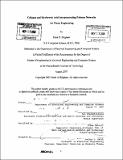Collagen and hyaluronic acid interpenetrating polymer networks for tissue engineering
Author(s)
Brigham, Mark D
DownloadFull printable version (15.55Mb)
Alternative title
Collagen and hyaluronic acid IPNs for tissue engineering
Other Contributors
Massachusetts Institute of Technology. Dept. of Electrical Engineering and Computer Science.
Advisor
Ali Khademhosseini and Utkan Demirci.
Terms of use
Metadata
Show full item recordAbstract
Interpenetrating Polymer Networks (IPNs) represent a strategy for combining the properties of several polymeric materials into a single network. In this thesis, collagen and methacrylated hyaluronic acid are combined in IPNs to produce a range of new biocompatible. The fabrication method allows for control of compressive strength of the IPN hydrogels. The materials are confirmed to be homogeneous at microscopic scales with fluorescent techniques. The IPNs are used for cell encapsulation and have the potential to be used for surface cell culture. The mechanical properties can be adjusted to match those of cardiac tissue. Thus, when combined with the properties of biocompatibility, viable cell encapsulation, and cell culture, the collagenMeHA IPN hydrogels represent a powerful new material for tissue engineering applications.
Description
Thesis (M. Eng.)--Massachusetts Institute of Technology, Dept. of Electrical Engineering and Computer Science, 2007. Includes bibliographical references (leaves 68-70).
Date issued
2007Department
Massachusetts Institute of Technology. Department of Electrical Engineering and Computer SciencePublisher
Massachusetts Institute of Technology
Keywords
Electrical Engineering and Computer Science.